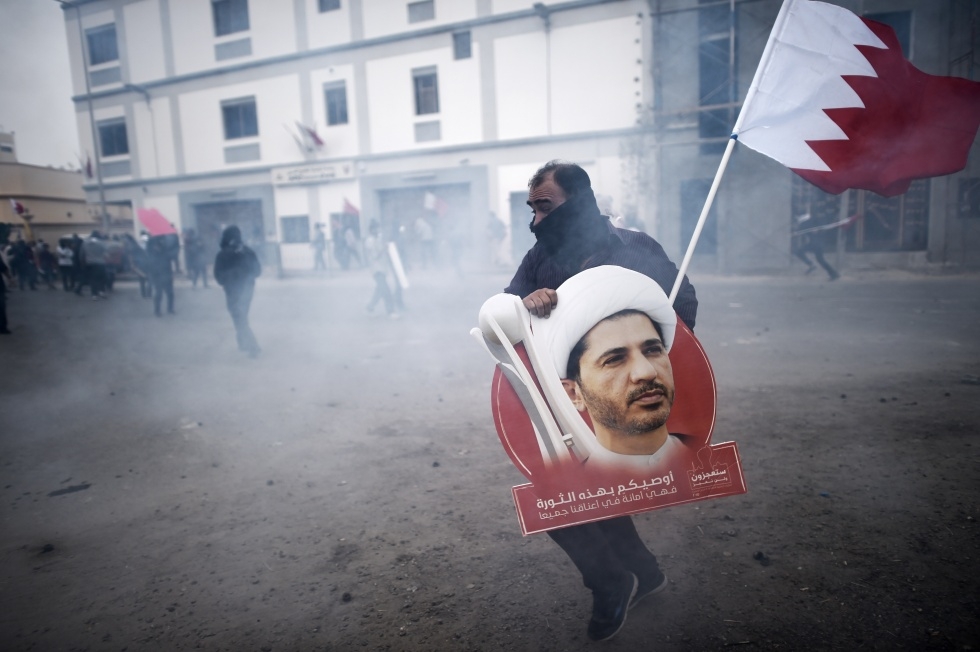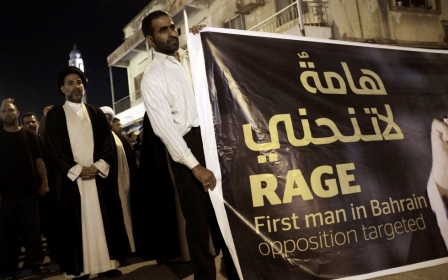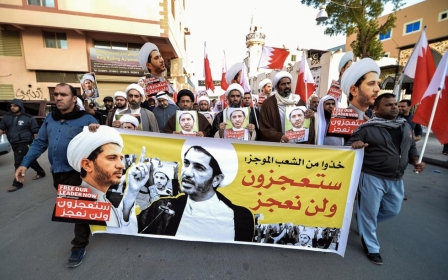Bahrain marks fourth anniversary of uprisings with tear gas and birdshot

Protesters and police clashed in Bahrain on Saturday as Bahrainis marked the fourth anniversary of the start of demonstrations against the ruling Khalifa monarchy in 2011.
Police fired tear gas and sound bombs against hundreds of protesters and increased security around numerous streets and villages around the country.
Protesters chanted down “Down Hamad” - in reference to ruling King Hamad bin Isa al-Khalifa - and flew the red and white national flag of Bahrain.
Though no fatalities have as of yet been reported, activists posted images on social media showing evidence of injuries sustained from birdshot.
Security measures were put in place aimed at preventing demonstrators from advancing towards the centre of the capital, Manama, where the 2011 uprising was focused.
Activists burned tyres and used rocks, garbage containers and branches to block roads in villages.
Public security chief Major-General Tariq al-Hassan issued stern warnings ahead of the protests, which were called by the February 14 Coalition, an anti-government youth group, under the slogan "Strike of Defiance".
"Action will be taken against those who spread terror among citizens or residents, put the safety of others at risk, or try to disrupt the nation's security and stability," Hassan said.
The opposition, which is made up of variety of liberal, left-wing and Shiite Islamist organisations, has called for the introduction of a genuine constitutional monarchy with an elected prime minister (who at present is appointed by the king) though some more radical protesters have sought the end of the Khalifa's dynasty's grip on power. It has ruled Bahrain since the 18th century.
Opposition leader Sheikh Ali Salman, secretary-general of the Shiite Islamist al-Wefaq party, is behind bars accused of trying to overthrow the government.
Protests have been held almost daily in Shiite villages since his arrest on 28 December, shortly after he was re-elected as head of al-Wefaq. There have also been reports of increasing attacks on security forces.
Other arrested opposition leaders include human rights activists Zainab al-Khawaja and Nabeel Rajab, campaigners for the Bahrain Centre for Human Rights.
Speaking to Middle East Eye shortly before being sentenced in late January to a six-month jail sentence for "insulting a public institution", Rajab warned that tensions in Bahrain were increasing.
“Almost each and every Shiite family has one or two prisoners or someone who has been shot, injured or killed,” Rajab said. “So the gap is deeper, the wound is deeper than two or three years ago. And Bahrain is going towards more repression.
“For the first time since the independence of the country [in 1971], we have a law in Manama saying that no peaceful protests are allowed altogether,” he added, also pointing out that protests outside the capital - while still legal - where also becoming intensely difficult to organise due to state repression.
Sayed Alwadei, director of advocacy at the Bahrain Institute for Rights and Democracy (BIRD), told MEE that it had been a challenge building up protests this year to the level of previous years due to increasingly restrictive laws on demonstrations.
“Hundreds of police cars have been spread all over this tiny country, the armed vehicles are in more or less every single exit to the villages," he said.
"So if you look at the conditions, how they’ve been trying to besiege or maintain all the villages, all the places, not allowing any single protest to take its time for over five or 10 minutes, immediately they will start the crackdown.
“So under the circumstances, you’re not going to see massive protests - it’s not because the people are not determined or not in high spirits, just simply because the new security repression used against them does not give them any chance.”
Teddy bears
One of the more unusual elements in this year's protests has been the ubiquitous presence of teddy bears in streets and at roadblocks.
Alwadei said it was a Valentine's Day message to the state.
"Maybe this is how we show our love on Valentine’s Day, by being on the streets and resisting the dictatorship and so on,” he said.
“So in a way they have a message to security forces that we are not scared of all the weapons they have, of all the mercenaries you’ve brought, from all the armed vehicles - no we are determined to be there in happy high spirits.”
“Almost each and every Shiite family have one or two prisoners or someone who has been shot, injured or killed,” says Rajab. “So the gap is deeper, the wound is deeper than two or three years ago. And Bahrain is going towards more repression.”
“For the first time since the independence of the country [in 1971], we have a law in Manama saying that no peaceful protests are allowed altogether,” he added, also pointing out that protests outside the capital - while still legal - where also becoming intensely difficult to organise due to state repression.
- See more at: http://www.middleeasteye.net/in-depth/features/bahraini-human-rights-leader-defiant-ahead-sentencing-528922005#sthash.uvreOZcV.dpuf'Little hope of progress'
Opposition leaders have faced the anniversary of the uprisings with an air of pessimism.
"The movement has reached its four years with the situation only getting worse and deteriorating, with citizens threatened with the loss of their nationality at any minute," al-Wefaq said on Twitter.
Al-Wefaq was banned in October for three months for violating a law on associations and boycotted parliamentary elections last year.
"There looks like little hope of progress in Bahrain. The opposition is barely legal," said Neil Partrick, a Gulf analyst at the Royal United Services Institute for Defence and Security Studies.
The government has been using the tool of stripping opposition activists - both in Bahrain and abroad - of their citizenship to curb their ability to influence.
Alwadei was among 72 people listed by the Bahraini interior ministry as having had their citizenship revoked in early February, allegedly for “defaming the image of the regime, inciting against the regime and spreading false news to hinder the rules of the constitution”.
"This is the sad reality in the country," he said. "When I was in Bahrain in 2011, I was beaten badly by the police, put in prison, subject to torture and exiled from the country. Now they continue to repress us by taking the last thing we have, which is our identity - that is how the ruling family is dealing with us."’
Attempts at a "national dialogue" in Bahrain have so far failed to produce results.
Bahrain's strategic position, hosting the US Navy's Fifth Fleet and taking part in the US-led coalition fighting the Islamic State in Iraq and Syria, has made the international community reluctant to apply pressure on the country over the continuing crackdown on protesters.
Speaking in Bahrain last month, UK Foreign Secretary Philip Hammond praised the government's attempts at reform.
"It is a country which is travelling in the right direction,” he said. “It is making significant reform. The crown prince who is charged with this agenda is directly engaged and has made significant progress even over the last few months.”
In December, Hammond announced plans for the UK to build a new naval base in Bahrain.
In spite of this, Rachel Peterson, director of communications at Americans for Democracy and Human Rights in Bahrain (ADHRB), suggested a potential shift in the US, particularly due to concerns over the growth in radical sectarianism in the country.
"In our conversations with the US government, the executive branch and the congressional branch, we have seen a growing concern for the situation," she told MEE. "They are understanding the fact that in addition to needing to work with this government in coalition against IS, there are some concerns with Bahraini domestic policy in terms of encouraging extremism in the region. So they are trying to find that balance.
"We're cautiously optimistic that the US government will start utilising additional leverage to push for reforms. I think that with the fact that this uprising is not going away, these are legitimate demands and it is in the US interest to address them."
She also suggested that the presence of the Fifth Fleet could also be a factor in US discomfort.
"Realistically speaking, should the situation deteriorate any further, it will not be a hospitable place for the US fleet to be based," she said.
Middle East Eye propose une couverture et une analyse indépendantes et incomparables du Moyen-Orient, de l’Afrique du Nord et d’autres régions du monde. Pour en savoir plus sur la reprise de ce contenu et les frais qui s’appliquent, veuillez remplir ce formulaire [en anglais]. Pour en savoir plus sur MEE, cliquez ici [en anglais].




